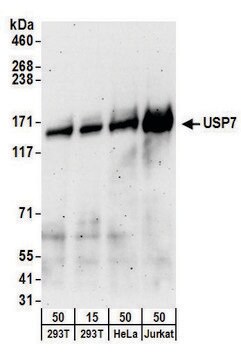ABC225
Anti-phospho USP7 (Ser18) Antibody
from rabbit, purified by affinity chromatography
Synonym(s):
Ubiquitin carboxyl-terminal hydrolase 7, Deubiquitinating enzyme 7, Herpesvirus-associated ubiquitin-specific protease, Ubiquitin thioesterase 7, Ubiquitin-specific-processing protease 7
About This Item
Recommended Products
biological source
rabbit
Quality Level
antibody form
affinity isolated antibody
antibody product type
primary antibodies
clone
polyclonal
purified by
affinity chromatography
species reactivity
human
species reactivity (predicted by homology)
mouse (based on 100% sequence homology), rat (based on 100% sequence homology), porcine (based on 100% sequence homology), Xenopus (based on 100% sequence homology)
technique(s)
inhibition assay: suitable (peptide)
western blot: suitable
NCBI accession no.
UniProt accession no.
shipped in
wet ice
target post-translational modification
phosphorylation (pSer18)
Gene Information
human ... USP7(7874)
Related Categories
General description
Immunogen
Application
Western Blotting Analysis: 0.02 µg/mL from a representative lot detected phospho USP7 (Ser18) in HeLa cell lysate (Prof. Grigory Dianov, University of Oxford, U.K.).
Western Blotting Analysis: 0.02 µg/mL from a representative lot detected 100 ng of phospho USP7 (Ser18), and not dephosphorylated USP7 (Prof. Grigory Dianov, University of Oxford, U.K.).
Alexa Fluor™ is a registered trademark of Life Technologies.
Apoptosis & Cancer
Apoptosis - Additional
Quality
Western Blotting Analysis: 0.2 µg/mL of this antibody detected phospho USP7 (Ser18) in 10 µg of HeLa cell lysate.
Target description
Physical form
Storage and Stability
Legal Information
Disclaimer
Not finding the right product?
Try our Product Selector Tool.
Storage Class Code
12 - Non Combustible Liquids
WGK
WGK 1
Flash Point(F)
Not applicable
Flash Point(C)
Not applicable
Certificates of Analysis (COA)
Search for Certificates of Analysis (COA) by entering the products Lot/Batch Number. Lot and Batch Numbers can be found on a product’s label following the words ‘Lot’ or ‘Batch’.
Already Own This Product?
Find documentation for the products that you have recently purchased in the Document Library.
Our team of scientists has experience in all areas of research including Life Science, Material Science, Chemical Synthesis, Chromatography, Analytical and many others.
Contact Technical Service






